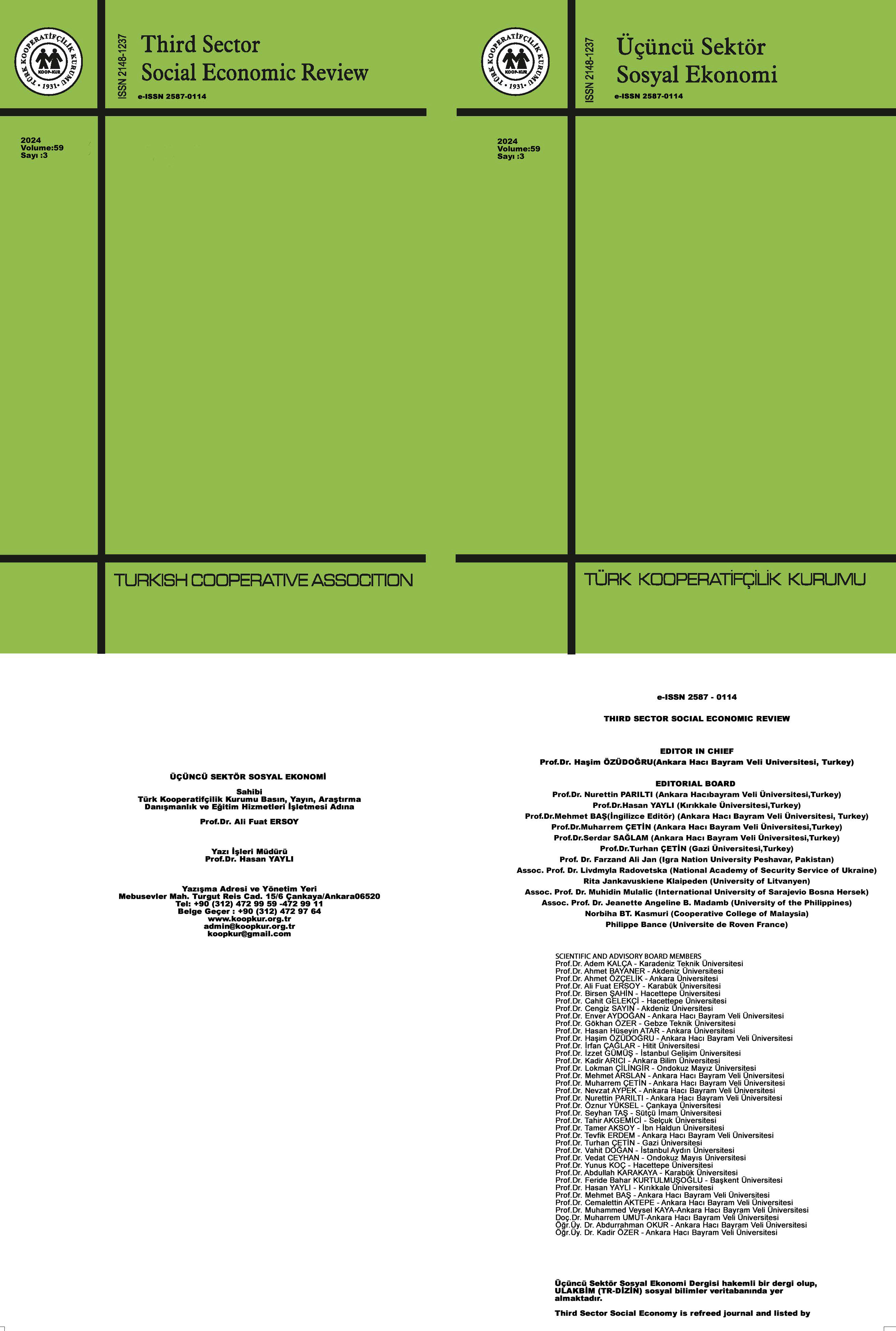Yıl: 2017 Cilt: 52 Sayı: ÖZEL SAYI Sayfa: 897-921
doi: 10.15659/3.sektor-sosyal-ekonomi.17.12.846
TÜRK KOOPERATİFÇİLİĞİNİN DÖNEMSEL ANALİZİ (1950-1960 DÖNEMİ)
YASEMİN MEMİOĞLU
1950-1960 dönemi, II. Dünya Savaşı’nın sona erdiği, ekonomide canlanmaların başladığı ve çok partili siyasal hayata geçişle birlikte ilk iktidar değişiminin yaşandığı bir dönemdir. İktidara gelen yeni hükümet, hükümet programlarında da bahsettiği özel sektör eliyle iktisadi kalkınma politikasını benimsemiştir. Atatürk’ün vefatı ve arkasından II. Dünya Savaşı yıllarında yaşanan sıkıntılar sebebiyle ekonominin durgunlaşması sonucu kooperatifçilik hareketleri yavaşlamıştır. Çok partili siyasal hayata geçilmesi, ekonominin dış yardım ve yabancı sermayeye açılması ile savaş yıllarında özel sermaye birikiminin ileri boyutlara ulaşması, ekonomik ve sosyal gelişme için uygun ortamı hazırlamıştır. Liberal politikaların ön plana çıktığı bu süreçte, özellikle dönemin ilk yarısında, ekonomi önemli oranda büyümüştür. Bu gelişmede tarım sektörünün rolü önemlidir. Hızlı makineleşme, yeni alanların üretime açılması ve mevsim şartlarının elverişliliği ile tarım kesimi hızla gelişmiştir. Buna bağlı olarak tarımsal girdileri kullanan gıda, tütün, dokuma gibi sanayi dalları gelişmiştir. Özellikle dayanıksız tüketim malları üretimi, tüm nüfusun ihtiyaçlarını karşılayacak seviyede artmıştır. Hizmet sektörü de ticaret, ulaştırma, inşaat başta olmak üzere bu dönemde önemli ilerlemeler kaydetmiştir.
Bu on yıllık süreçte ortalama %6,3 oranında büyüyen Türkiye ekonomisindeki iyileşme, kooperatifçilik alanına da yansımıştır. Cumhuriyet Dönemi, kooperatifçilik sektörü için çok verimli geçmiştir. Yasal düzenlemeler ve kurulan yeni kooperatifler ile kooperatifçilik fikri yayılmış, sağlam bir altyapı oluşturulmuştur. Bu altyapıyı devralan yeni hükümet de hükümet programlarında, kooperatiflere gereken önemin verilmesi, kooperatifçilik yasal düzenlemelerinin yapılması mevzularına yer vermiştir. Nitekim 1951 yılında, ilk esnaf ve sanatkârlar kefalet kooperatifi olan Ankara Esnaf Kefalet Kooperatifi kurulmuştur. Böylece esnaf, sanatkâr ve küçük sanayicinin kredi sorunu çözülmüştür. Kısa zamanda sayıları artan bu kooperatifler 1954 yılında ilk Esnaf Kefalet Kooperatifleri Birliği’ni kurmuştur. Yine 1951 yılında, şeker sanayinin geliştirilmesi amacıyla ilk pancar ekicileri kooperatifi kurulmuştur. Zamanla sayıları artan ve PANKOBİRLİK adıyla üst birliklerini kuran bu kooperatifler, ülke tarımının gelişmesine önemli katkılar yapmıştır. Bunların kredi ve enerji gibi ihtiyaçlarını karşılamak için de 1953’te Şekerbank açılmıştır. Temelleri daha eskiye dayanan tarım kredi kooperatifleri ile tarım satış kooperatiflerinin sayıları ile bu işletmelere kullandırılan kredi miktarı da dönem süresince ciddi olarak artmıştır. Ülkemizdeki ilk sigorta kooperatifi de bu dönemde kurulmuştur. Ortaklarının sigorta ihtiyaçlarına cevap vermek amacı güden bu kooperatifin ilk örneği, 1958 yılında kurulan Birlik Sigortadır.
Yeni bir kooperatif kanunu çıkarılması fikriyle bu dönemde çeşitli kanun projeleri hazırlanmıştır. Bunlardan biri Colombain projesidir. Kooperatifçilik alanındaki eksiklerin giderilmesi amacıyla ülkemize gelen Colombain, aslında yetişmiş tecrübeli kooperatifçilerimizin bulunduğunu, ihtiyacın kooperatifçilik fikrinin tam anlamıyla yasalara yansıtılması olduğunu vurgulamıştır. Bu amaçla da bir kanun tasarısı hazırlamıştır. Colombain’in projesi Yusuf Sami Atasagun’un da bir proje kapsamında hazırladığı kanun tasarısı ile birleştirilip meclise sunulmuştur. Başka kanun tasarıları da meclise sunulmuş olsa da bir kooperatifçilik kanununun çıkması 1969 yılını bulmuştur. Onun yerine, 1956 yılında çıkarılan yeni Türk Ticaret Kanunu’nda kooperatif şirketler yeniden düzenlenmiştir. Kanun hazırlığı gelişmeleri ise özellikle basında yankı uyandırmıştır.
Kooperatifçilik hareketlerinin anlatıldığı bu çalışmanın amacı, hem ekonomik hem sosyal hayatta önemli bir yeri olan kooperatifleri dönemsel olarak inceleyip analizler yapmaktır. Siyasal hayatta yaşanan değişimlerin ekonomideki değişmelerle birleşmesi sonucunun, kooperatifler üzerindeki etkisinden bahsetmektir. Olumlu gelişmeler kaydedilen bu süreçte, çözülemeyen sorunlar da mevcuttur. Bir kooperatifler kanununun çıkarılamaması ve kooperatifçilik eğitiminin yeterli olmayışı bu dönemde öne çıkan en önemli sorunlardır. Elbette her dönemin olduğu gibi bu dönemin de hem olumlu hem olumsuz yönleri mevcuttur. Olması gerekenin maksimum kârı hedeflemek yerine, sürdürülebilir ekonomik ve sosyal kalkınmayı amaç edinmek olduğu kooperatifçiliğin, tüm eksiklerine rağmen, bu dönemde sağlam temeller attığı görülmektedir. Öyle ki birçoğu halen faaliyetlerini sürdürmektedir.
Anahtar Kelimeler (Keywords): Kooperatif, 1950-1960 dönemi, ekonomi, Colombain projesi, sürdürülebilir kalkınma, Celal Bayar
THE PERIODICAL ANALYSIS OF TURKISH COOPERATION (1950-1960 PERIOD)
The period of 1950-1960 is an era that World War II ended, economic recovery started and first political power changed as soon as transition to the multi-party system. The ruling new government has adopted the economic development by private sector policy which is also mention in government program. After Ataturk’s death and difficulties experienced during World War II, cooperatives movement slowed down. Transition to the multi-party political life, opening of the economy to foreign aid and foreign capital, accumulation of private capital in war years prepare appropriate environment for economic and social development. In this period, liberal policies were at the forefront, especially in the first half of it, economy grew considerably. The role of the agricultural sector in this development is important. The rapid mechanization in agriculture, opening of new areas for agricultural production and the availability of seasonal conditions developed the agricultural sector rapidly. As a result, industrial branches such as food, tobacco, and textile which use agricultural inputs, have developed. Especially, the production of non-durable consumption goods has increased at a level that meets the needs of the entire population. The service industry has also made significant progress in this period, particularly in trade, transportation and construction.
The improvement in the Turkish economy, which grew by an average of 6.3% over the last ten years, also reflected in the field of cooperatives. The Republic Period was very productive for the cooperative sector. With legal regulations and foundations of new cooperatives, cooperation idea spread and a solid background was established. The new government, which took over this background, mentioned some subjects including paying attention to cooperatives, making legal regulations of cooperatives, in their government program. Thus, in 1951, Ankara Tradesmen Credit and Guarantee Cooperative, first tradesmen and craftsmen credit and guarantee cooperative, was stated up. So, the credit problem of tradesmen, artisans and small industrialists has been solved. In 1954, these cooperatives, which increased in number in a short time, established the first Union of Tradesmen Credit and Guarantee Cooperative. Also in 1951, for the purpose of developing sugar industry, the first beet planters cooperative was founded. Increasing in number over time and founding their union under the name of PANKOBIRLIK, these cooperatives made significant contributions to the development of the country's agriculture sector. Sekerbank was opened in 1953 for the purpose of financing their needs such as credit and energy. The number of agricultural sales cooperatives and agricultural credit cooperatives and the amount of credit used for these cooperatives increased significantly during the period. The first insurance cooperative in our country was established in this period. The first example of this type of cooperative is Birlik Insurance, which was established in 1958 to respond to the insurance needs of its shareholders.
With the idea of introducing a new cooperative law, various law projects were prepared in this period. One of them is the Colombain project. Colombain came to our country in order to overcome the shortcomings in the field of cooperatives and emphasized that there were experienced cooperationists in our country, in fact the necessity was the reflection of the full sense of the idea of cooperation. For this purpose, he prepared a draft law. Colombain’s project was combined law draft prepared by Yusuf Sami Atasagun under a project and presented to the parliament. Although other law drafts were presented to the parliament, a cooperative law was accepted in 1969. Instead, in the new Turkish Commercial Code, issued in 1956, cooperative companies were reorganized. The developments in the preparation of the law had good impressions especially in media.
The purpose of this work, which cooperative proceedings are explained, is to make periodical reviews and analyzes of cooperatives, important for both economic and social life. It is to talk about how changes in political life unifying the changes in the economy effect cooperatives. There are also unresolved problems in this period where positive developments are recorded. The lack of a cooperative law and inadequate cooperative education are the prominent problems. Of course, there are both positive and negative aspects in this period as it is in every one. In spite of all the shortcomings of cooperatives, which aim to achieve sustainable economic and social development, instead of aiming for maximum profit, it seems that they have established solid basis in 1950-1960. So, many of them are still active.
Anahtar Kelimeler (Keywords): Cooperative, 1950-1960 period, economy, Colombain project, sustainable development, Celal Bayar
Tam Metin 1794











